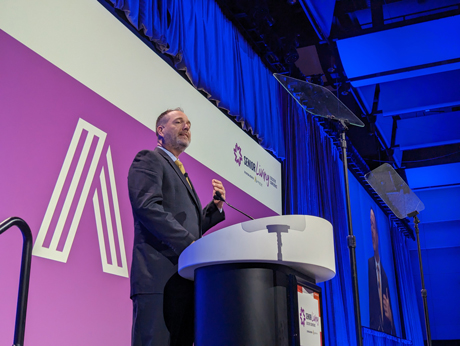NEW ORLEANS — Although the proposed Safeguarding Elderly Needs for Infrastructure and Occupational Resources (SENIOR) Act never was passed by the federal government in 2022, the fight isn’t over.
The goal of that act is to establish a $100 billion fund that builds upon critical infrastructure demands for infection prevention and control; invests in broadband and telehealth capabilities; creates a sustainability fund to ensure seniors’ long-term care needs are exceeded; and invests in workforce training and development.
Argentum, an association for professionally managed senior living communities, hopes to bring back the bill under a new Congress this year.
“We’ve moved from an aspirational bill in the previous Congress to a focused effort with the current Congress,” said James Balda, president and CEO of the organizations.
His comments came during a “State of the Industry” address at the Argentum Senior Living Executive Conference, currently underway in New Orleans. Over 2,700 attendees are at the conference.
During the address, Balda laid out the three-pronged plan to demonstrate the value of senior living, develop a larger workforce, and increase access and affordability for seniors.
“In just over 10 years there will be more seniors than children for the first time in our history,” said Balda. “As a nation we’re far from being ready for this avalanche of people that need our care.”
Some of the ways Argentum plans to tackle the issues include expanding its apprenticeship program beyond its current three-state pilot program, pushing for immigration reform to bring in new workers and, hopefully, finally getting the SENIOR Act passed.
Both Balda and Joel Nelson, chair of the Argentum board and CEO of LCS, urged members to act on a local level with state legislators to improve the environment for seniors housing operators.
“It’s all well and good to say we want legislation passed, but the hard work comes from the ground up, the grass roots,” said Balda. “We all need to work together to get in the ear of every lawmaker we can. Imagine the impact we’d have if everyone here hosted a representative this year.”
The executives suggested operators invite local legislators to tour buildings and bend their ear about state legislation that could help with workforce development and affordability.
“Many believe incorrectly that Medicare and Medicaid or private insurance will cover their long-term expenses,” said Nelson. “That leaves far too many people covering the care and the costs themselves.”
Some encouraging programs the executives named included a recently launched program where veterans could elect to voluntarily enter assisted living rather than skilled nursing, and still be covered by their VA benefits.
The Argentum Senior Living Executive Conference continues through Wednesday, May 10.
— Jeff Shaw

